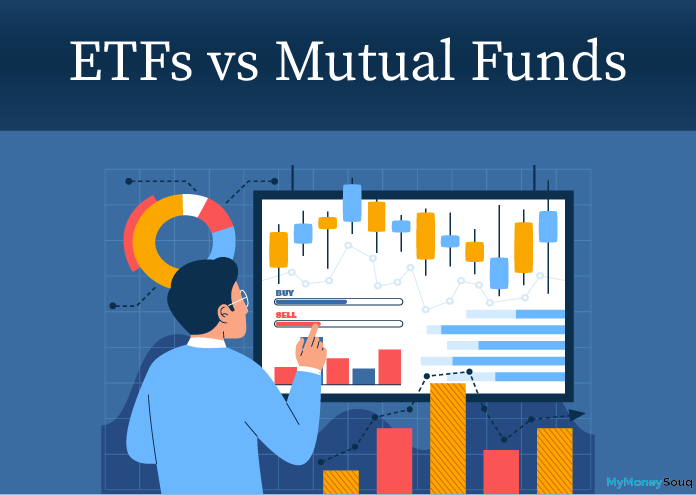The ETF which stands for Exchange Traded Funds and Mutual Funds are the most popular investment options. Even a person who’s not into investments would have heard of mutual funds and ETFs. Though all the investment options are for growing the wealth, the working of each investment option is different. And an investor needs to pick the right investment option according to the investment goal and risk appetite. While talking about ETFs and Mutual Funds, though these are the popular investment options, it’s essential to understand the difference between these two before investing in either of them.
Exchange-Traded Funds, as the name suggests, funds are traded on exchanges. The assets under ETFs are stocks, commodities, and bonds. ETFs have passively managed Index funds listed on stock exchanges that contain all the stocks or shares which carry the same index value. These can be bought or sold in real-time and the prices vary throughout the day.
While on the other hand, Mutual Funds are the pool of money collected from different investors with the same investment goal and risk appetite and invested across a range of assets and securities. The fund manager manages the investment pool right from assessing the different securities and investing in the right ones. The fund manager will be an experienced professional. The profit or loss will be the same for every investor in the mutual funds.
Mutual Funds vs ETFs
| Mutual Funds | Exchange Traded Funds (ETFs) |
| Mutual Funds are actively managed funds by the fund manager | These are passively managed funds |
| Mutual Funds are controlled by your fund manager | ETFs can be managed purchased or sold freely by the investor |
| Can be traded only at the end of the day | An investor can manage it freely and trade at any time of the day based on the market conditions |
| The lock-in period for mutual funds is 9 days to 3 years | There is no lock-in period in the ETFs |
| Types of assets included in the mutual funds are stocks, gold, bonds, etc. | Types of assets included in the ETFs are stocks, gold, bonds, etc. |
| The expense fees on mutual funds are higher | The expense fees on ETFs are less |
| There is a minimum investment amount required to fit into a portfolio for mutual funds | There is no minimum investment amount specified |
| There is a brokerage commission charged | There can be no brokerage commission required |
| Provides an investment diversification option | Even ETFs offer an investment diversification option |
| The transaction costs are zero or lower while buying or selling the mutual funds | There are certain transaction costs levied while buying or selling ETFs |
Mutual Funds vs Exchange Traded Funds – Which is recommended?
Both ETFs and Mutual Funds offer diversified investment portfolios which makes them less risky for the investors. However, any investment option should be picked only after assessing a few factors like the investor’s goal, risk appetite, the process to liquidate the asset, and investment time. When you consider these factors the investment option that matches these options can be finalized. Though ETFs offer high flexibility and good returns in the short-term while mutual funds are invested for a specific period of time, there is no recommendation that can be made as each offers its own benefits depending upon the investor’s requirement.
About the author
Nikitha is a Senior Analyst at MyMoneySouq.com. She has been writing about personal finance, credit cards, mortgage, and other personal finance products in the UAE. Her work on Mortgage loans has been featured by the GulfNews and other popular Financial Blogs in the UAE.


